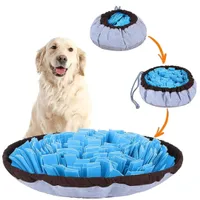Trainer reveals surprising thing you can do to lessen your dog's reactivity (and we'll definitely be giving this one a go!)
Your dog can’t avoid their triggers altogether, but you can help them cope with them better.

If your dog struggles with reactivity, how can you help them?
Whatever your dog’s triggers, it can be difficult to avoid them entirely – if your dog is reactive with other dogs, you’ll still see them on walks, for example. But if you do your best to ensure that your dog is happy and healthy in their everyday life, to begin with, it can mean that they’re better equipped to cope with their triggers when they do come into contact with them.
This could entail everything from making sure your pup is getting enough sleep to enjoying plenty of play sessions with the best dog toys! Juliana DeWillems, owner and head trainer at JW Dog Training & Behavior, has explained how we can support our pups without having to train around their triggers in a new Instagram post. Let’s take a look…
A post shared by JW Dog Training & Behavior Consulting (@jwdogtraining)
A photo posted by on
When it comes to reactivity, it’s important to first rule out any medical issues or sources of pain. “When a dog isn’t feeling well it can cause them to be more reactive or aggressive,” explains DeWillems. “Anything from GI issues to arthritis to allergies can set the stage for your dog to be more irritable and sensitive to their triggers.”
To get answers, you may need to really advocate for your pup, or even look at getting a second opinion from a specialist. But once you’ve ruled out something more sinister, or just in the meantime, it’s a good idea to make sure they’re getting enough enrichment at home.
DeWillems advises making sure your pup has enough time to enjoy species-specific behaviors, like sniffing, chewing, licking, digging, shredding, and spending time with friends – be they humans or fellow canines! By doing so, your dog can reduce their stress levels, and enrichment can help them recover after a stressful event, too.
Great for providing physical and mental stimulation and releasing excess energy and stress, this snuffle mat features a non-slip and portable design and is made from eco-friendly and washable materials.
While enrichment is certainly important, sleep is also vital when it comes to your dog feeling healthy and happy. “If your dog is not sleeping through the night or is not resting for many hours during the day, they could be sleep deprived,” says DeWillems. Make no mistake – lack of sleep can have an impact on reactivity in dogs.
Get the best advice, tips and top tech for your beloved Pets
When your pup wakes up, having plenty of freedom to move around and use their body can help, too. Dogs experience a lot of restriction due to the way the world is designed for humans, so the chance to run around off-leash in a safe environment can help them cope with triggers better. Likewise, play is vital – why not take some time out each day to follow your dog’s lead and engage in the type of play they like the most?
Alongside play, you can also practice any behaviors you’d like your dog to display when around triggers at home, with some simple training sessions. “The more you practice, the more likely your dog will be to respond around their triggers,” DeWillems says.
Remember: you won’t solve your dog’s reactivity overnight, but you can certainly put the wheels in motion when it comes to helping them cope. Your pup will thank you! You might find this article useful, too: Owning a reactive dog is hard. Here's how I navigated the social challenges with my pooch.

Adam is a freelance journalist specialising in pets, music and culture, and mental health and wellbeing. He investigates and writes the large majority of news on PetsRadar, and collaborates with veterinary experts to produce informative pet care content.
Adam has a journalism degree from Southampton Solent University and a masters degree in Magazine Journalism from Cardiff University. He was previously senior editor at dog advice website DogTime.com, and has also written for The Independent, GoodToKnow and Healthline.
He owns two rescue cats, Bunny and Dougie, and has also previously had a rabbit, fish and Roborovski dwarf hamsters.

